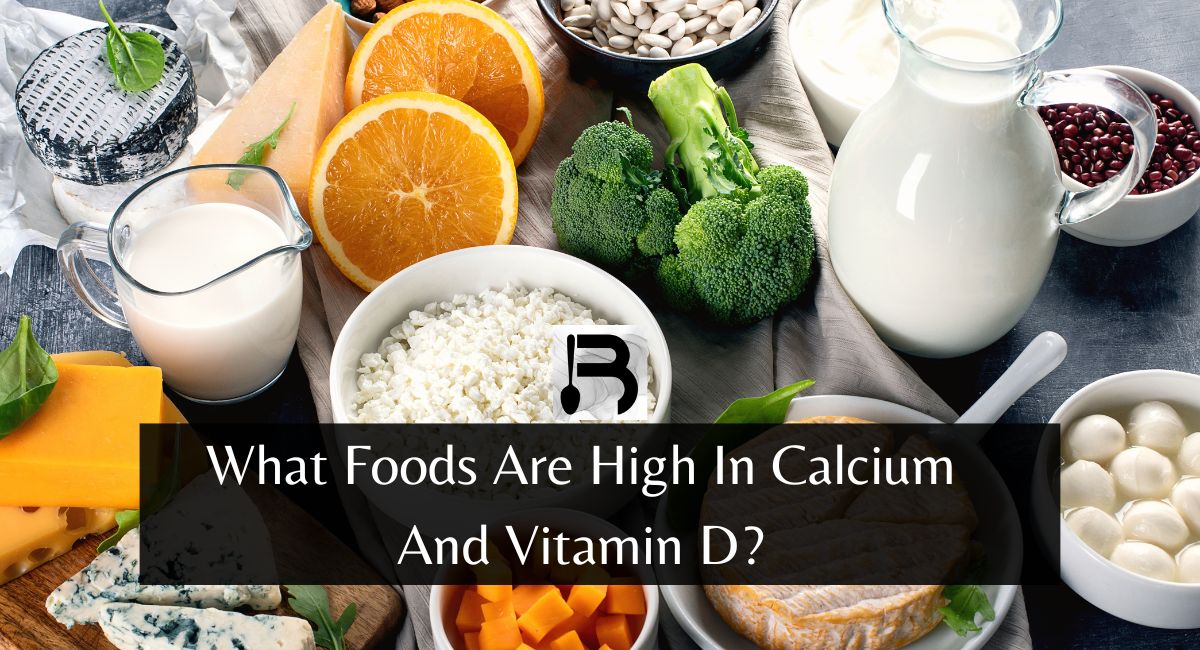Calcium and Vitamin D are the two important nutrients that play pivotal roles in maintaining strong bones and overall health. While they’re often associated with dairy products and sunlight, respectively, the world of nutrition offers a diverse array of foods rich in these vital components.
Whether you’re looking to boost your bone health, ensure proper muscle function, or simply diversify your diet, understanding the top sources of calcium and vitamin D can be a game-changer. So, what foods are high in calcium and vitamin D?
This article explores the various foods that are abundant in these nutrients, offering readers a comprehensive guide to fortifying their diets.
What Foods Are High In Calcium And Vitamin D?
Calcium and vitamin D are often hailed as the dynamic duo of bone health. While both play distinct roles in the body, their combined effect is particularly potent for maintaining strong bones and overall health. Here are the good sources of Calcium and Vitamin D:
Calcium: The Bone Builder
Calcium is a mineral that’s abundant in the human body, predominantly in our bones and teeth. It’s vital for bone health and muscle function, nerve transmission, and blood clotting.
- Dairy Delights: Milk, cheese, and yogurt are traditional stalwarts when it comes to calcium. They’re not only rich in calcium but also come packed with other essential nutrients like protein, vitamin B12, and phosphorus.
- Green Leafy Vegetables: Kale & collard greens are calcium-rich, while spinach, though high in calcium, contains oxalates that can reduce calcium absorption.
- Fishy Favorites: Canned sardines and salmon, with their edible bones, offer a hearty dose of calcium. They’re also a treat for those who love seafood.
- Plant-Based Powerhouses: Tofu and tempeh, especially when set with calcium sulfate, are excellent sources. Many plant-based milk alternatives, such as almond and soy milk, are often fortified with calcium.
- Seeds and Nuts: Chia seeds, flaxseeds, almonds, and sesame seeds can be seamlessly integrated into diets for a calcium boost.
- Legumes: Beans and lentils are not only protein-packed but also offer a good amount of calcium.
- Fruits: Oranges and figs are among the fruits that provide calcium, making for a sweet way to meet your daily needs.
Vitamin D: The Sunshine Vitamin
Vitamin D is unique. While it’s found in certain foods, our primary source is sunlight. When our skin is exposed to UVB rays, it synthesizes vitamin D. This vitamin aids in calcium absorption in the gut, ensuring that calcium finds its way into bones.
- Fatty Fish: Salmon, mackerel, and sardines are not only god in omega-3 fatty acids but are also among the best natural sources of vitamin D.
- Fortified Stars: Due to the limited natural food sources of vitamin D, many foods are fortified with it. These include dairy products, plant-based milk, cereals, and certain juices.
- Egg Yolks: A breakfast staple, the yolk of the egg is where the vitamin D is at. It’s a convenient way to get a dose of this nutrient.
- Mushrooms: Certain mushrooms, like maitake and shiitake, can produce vitamin D when come in contact with sunlight or ultraviolet (UV) light. However, it’s worth noting that they provide a different form of the vitamin, called D2, whereas animal sources provide D3.
- Cod Liver Oil: While it might not be everyone’s first choice, this oil is incredibly rich in vitamin D. It can be taken as a supplement if the taste is too strong.
- Beef Liver: A more niche choice, but for those who enjoy it, beef liver provides a modest amount of vitamin D.
The Synergy of Calcium and Vitamin D
While both calcium and vitamin D are individually essential, their combined action is what truly stands out. Vitamin D works in the absorption of calcium in the intestines, ensuring that the calcium we consume is effectively used by the body. This synergy underscores the importance of ensuring adequate intake of both nutrients.
For those living in areas with limited sunlight or with dietary restrictions, supplements might be a consideration. However, it’s crucial to remember that while supplements can be beneficial, they should complement a balanced diet and not replace it. Before starting any supplement, consulting with a healthcare professional is paramount.
What Food Has The Highest Calcium?
Calcium is abundant in various foods. Dairy products like milk, cheese, & yogurt are top sources. Sardines and canned salmon, with bones, also provide significant calcium. Leafy green vegetables, especially collard greens, kale, and turnip greens, are plant-based sources.
Fortified foods, like cereals, orange juice, and plant-based milks (like almond or soy), often contain added calcium. Sesame seeds and almonds are calcium-rich nuts. Always check nutritional labels for specific content.
Which Foods Are Rich In Calcium And Vit D?
Calcium & vitamin D are essential for bone health. Foods rich in both include:
- Fatty fish: Salmon, mackerel, and sardines.
- Fortified foods: Many dairy products, cereals, and plant-based milks (like almond, soy, and rice milk) are fortified with both nutrients.
- Dairy: Natural sources of calcium, with some yogurts fortified with vitamin D.
- Cheese: Especially hard cheeses.
- Egg yolks: Contain vitamin D.
- Mushrooms: Some varieties, when exposed to sunlight, produce vitamin D.
Bottom Line
Diverse foods, ranging from dairy products to certain fish and fortified foods, are rich in calcium and vitamin D. Incorporating a mix of these foods into your daily diet can help ensure optimal bone health and provide other essential health benefits.
Always consult with a nutritionist or healthcare provider to tailor your intake based on individual needs and to ensure a balanced and holistic approach to nutrition.
Read: What Happens If You Eat Too Much Shrimp?

